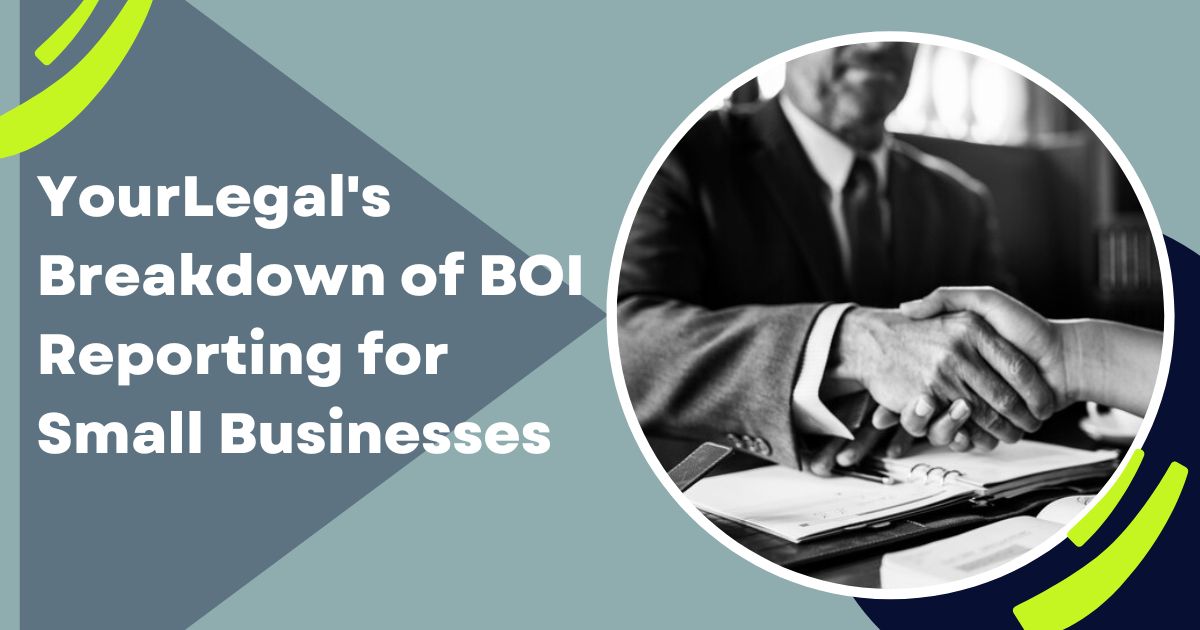YourLegal’s Breakdown of BOI Reporting for Small Businesses

YourLegal’s Breakdown of BOI Reporting for Small Businesses
Key Points
We’ve got some news that’s crucial for you – a recently introduced requirement known as Beneficial Ownership Information (BOI) reporting. Starting January 1, 2024, small businesses, including yours, are required to file a BOI report with the Financial Crimes Enforcement Network (FinCEN), a branch of the U.S. Department of Treasury. YourLegal is here to demystify the essentials and guide you through the intricacies of what this means for you and your business.
Understanding BOI Reporting
So, what’s the scope of BOI reporting? Simply put, it’s a governmental initiative aimed at gaining insight into the ownership and control structures of small businesses. Failure to comply comes with serious consequences, including substantial fines and, in extreme cases, potential jail time for those not adhering to the regulations.
Who Needs to File?
If your business is structured as a corporation (S corp or C corp) or a limited liability company (LLC), chances are high that a BOI report is in your future, unless your business qualifies for one of the 23 exemptions outlined. Exemptions are crucial to understand, especially for small corporations or LLCs. Sole proprietorships and most general partnerships are likely to be exempt, as FinCEN has indicated in its statements.
Exemptions Explained
Delving into the exemptions provided by the Corporate Transparency Act, certain businesses, termed “large operating companies,” can sidestep BOI reporting if they have more than 20 employees, boast over $5 million in gross receipts, and maintain a physical office presence in the USA. Additionally, certain inactive entities in existence on or before January 1, 2020, receive an exemption. Familiarizing yourself with these exemptions is vital for determining your business’s status.
When, Where, and How to File
For businesses falling under the “reporting company” category, the filing window for the BOI report is between January 1, 2024, and January 1, 2025. Reporting companies formed on or after January 1, 2024 and before January 1, 2025 have to file within 90 days of receiving actual or public notice of their formation. The filing process is conducted electronically through FinCEN’s website, and it’s important to note that there’s no state filing involved. It’s advisable to mark your calendar with the relevant deadlines based on your business’s formation date.
Information Required for Filing
What exactly needs to be reported? The foundational details about your company, such as its legal name, address, and taxpayer identification number, form the basics. However, the crux lies in providing personally identifiable information for each beneficial owner – those individuals with at least 25 percent control of the company. This includes comprehensive details like names, birthdates, addresses, and identification numbers from a driver’s license, state ID, or passport.
Changes and Corrections
In the dynamic world of business, change is inevitable. If any information in your report undergoes alterations or if inaccuracies are discovered, the clock starts ticking. You have a 30-day window to file an update or a corrected report to ensure that your records stay accurate and up-to-date.
Confidentiality Concerns
Concerned about the privacy of the information you’re disclosing? Access to BOI information is restricted to authorized entities, encompassing federal law enforcement, national security agencies, financial institutions with your explicit consent, and others. Recognizing the importance of data security, FinCEN is obligated to implement robust protocols to safeguard your sensitive information.
The Impact on Small Business Owners
Now, let’s delve into the practical impact on you, the small business owner. The BOI reporting requirement introduces a series of decisions to be made – from determining the necessity of filing to gathering the requisite personal information and choosing between direct filing or utilizing a third-party service. Compliance becomes paramount to sidestep the penalties outlined in the Corporate Transparency Act.
Conclusion: YourLegal Has Your Back
In this ever-shifting landscape of small business regulations, YourLegal stands as your dedicated partner in navigating the BOI reporting process. We comprehend the nuances of this new requirement, and we’re poised to assist you in navigating it seamlessly. While compliance may seem like a daunting task, with the right support, you can ensure your business remains on the right side of the law.
Understanding BOI reporting is not just a regulatory necessity; it’s a step towards safeguarding your business from potential troubles. YourLegal is your trusted ally in this journey – together!

